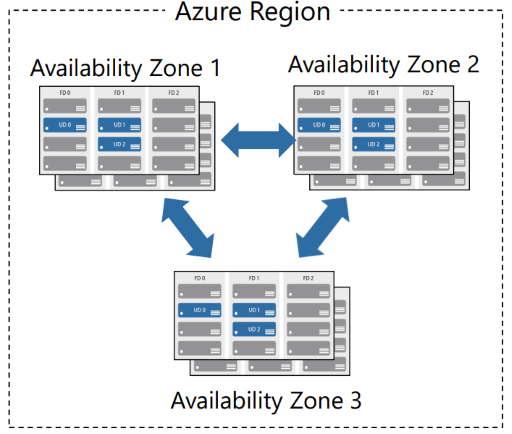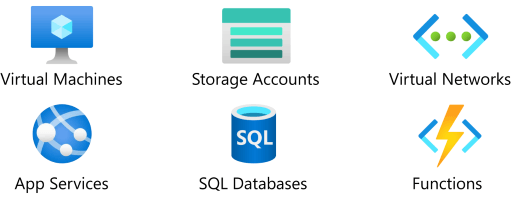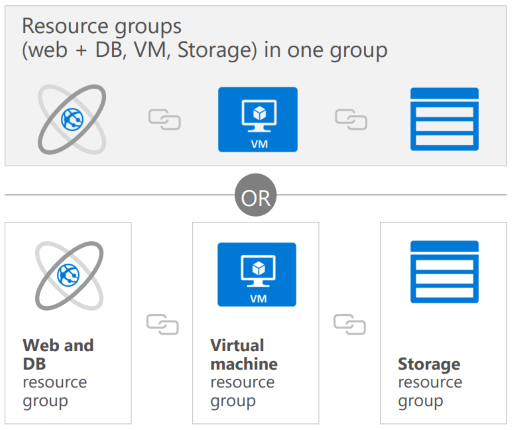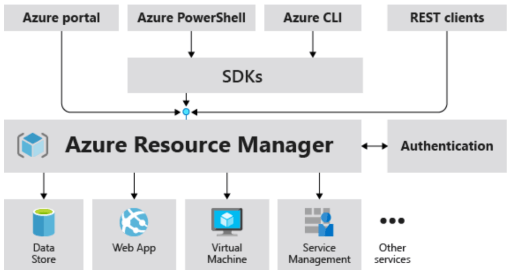Last updated on July 13th, 2024 at 11:11 am
We will discuss Azure services, types of services, azure architectural components, and Azure core resources – compute services, network services, storage services, and database services.
Table of Contents
1. What is Azure Services?
Azure Services are the core set of cloud computing services that allow you to deploy and manage workloads on Microsoft Azure. These services provide the infrastructure, tools, and platforms for computing and storage needs.
It allows you to quickly and securely deploy workloads in the cloud and provide the scalability and reliability needed for applications and services.
1.2 Types of Azure Services
There are two types of azure services:
- Azure Architectural Components
- Azure Core-Resources
2. Azure Architectural Components
Azure is an Operating system, which manages a data center of Microsoft. To manage the data center, below are the key architectural components –
- Region’s and Region’s Pairs
- Availability Zone
- Azure Resources
- Resource Group
- Azure Resource Managers
- Azure Subscriptions
- Azure Management Groups
2.1 Region’s
Azure offers more global regions than any other cloud provider with 60+ regions representing over 140+ countries.
- Regions are made up of one or more data centers.
- Provide flexibility and scale to reduce customer latency.
- Preserve data residency with a comprehensive compliance offer.
2.2 Region’s Pairs
For availability, in the worst case scenario, a complete region might be outage (might be due to natural problems or some disaster like flood, or power outage). To avoid this problem, a region-pairs is done where Microsoft creates a pair-zone to prevent data during such a disaster.
- Both regions should be in the same geographical location.
- At least 300 miles of separation between region pairs.
- Automatic replicate for some services.
- Prioritized region recovery in the event of an outage.
- Updates are rolled out sequentially to minimize downtime.
| Regions | Regions-Pair |
|---|---|
| North Central US | South Central US |
| East US | West US |
| West US 2 | West Central US |
| US East 2 | Central US |
| India South | India Central |
| Canada Central | Canada East |
| Japan East | Japan West |
2.3 Availability Zone
Availability is a factor that decides how much time is our application up and running. Availability is defined by SLA (Service Level Agreement). For example: 100% means no downtime, always working.
One zone is treated as one data center. Multiple zone lead for regions. Each zones are interconnected via fiber-optic networks.

- Protect against downtime due to data center failure.
- Physically separate data centers within the same region.
- Each data center is equipped with independent power, cooling, and networking.

2.4 Azure Resources
Azure Resources are components like storage, virtual machines, app services, SQL databases, functions, and networks that are available to build cloud solutions.

2.5 Resource Group
A Resource Group is a container to manage and aggregate resources in a single unit. A Resource in a resource group can be moved from one resource group to another resource group but one time only associated with one resource group. In case the resource group is deleted, it will automatically delete all resources.
- Resources can exist in only one resource group.
- Resources can exist in different regions.
- Resources can be moved to different resource groups.
- Applications can utilize multiple resource groups.

2.6 Azure Resource Managers
The Azure Resource Manager (ARM) provides a management layer that enables creating, updating, and deleting resources in Azure subscription. As we know, Azure is an operating system, that manages the data center of Microsoft and various services present in the data center.
ARM is a deployment model which is used to communicate or help to interact with it.

2.7 Azure Subscriptions
To start working with Azure, we need a subscription to Azure. An Azure subscription provides authenticated and authorized access to Azure accounts.
- Billing boundary: generate separate billing reports and invoices for each subscription.
- Access control boundary: manage and control access to the resources that users can provision with specific subscriptions.

2.8 Azure Management Groups
Azure Management Groups are a hierarchy of management groups and subscriptions that helps to manage access, policy, and compliance for multiple subscriptions.
- Management groups can include multiple Azure subscriptions.
- Subscriptions inherit conditions applied to the management group.
- 10,000 management groups can be supported in a single directory.
- A management group tree can support up to six levels of depth.

3. Azure Core-Resources
Azure Core Services, also known as Azure Core Resources, are the fundamental building blocks for any Azure solution. They include several key components:
- Azure Compute Service
- Azure Network Service
- Azure Storage Service
- Azure Database Service
3.1 Azure Compute Service
Azure Compute is an on-demand computing service that provides computing resources such as disks, processors, memory, networking, and operating systems. Azure Compute Services are the core set of cloud computing services that allow you to deploy and manage workloads on Microsoft Azure.
These services provide the infrastructure, tools, and platforms for computing and storage needs. The following are the main computing options available in Azure:
- Virtual Machine: Virtual Machines are the software emulations of physical computers, which include virtual processors, memory, storage, and networking. It is an IaaS service, that allows us to deploy and manage VMs inside a virtual network (VNet).
- App Services: Azure App Services is a fully managed platform to build, deploy, and scale web apps and APIs quickly. Works with .Net, .NetC Core, Node.js, Java, Python, or PHP. It is a managed PaaS offering for hosting web apps, mobile app backends, RESTful APIs, or automated business processes.
- Container Instances: Azure Containers are a lightweight, virtualized environment that does not require operating system management, and can respond to changes on demand. It offers the fastest and most straightforward way to run a container in Azure without having to provision any virtual machines and without having to adopt a high-level service.
- Azure Kubernetes Services (AKS): Azure Kubernetes Services is an orchestration service for containers with distributed architecture and large. It manages a hosted Kubernetes service for running containerized applications.
- Windows Virtual Desktop: Windows Virtual Desktop is a desktop and app virtualization that runs in the cloud. It creates a full desktop virtualization environment without having to run additional gateway servers, publish unlimited host pools to accommodate diverse workloads, and reduce costs with pooled, multi-session resources.
- Service Fabric: Service Fabric is a platform that can run on any environment, including Azure or on-premises. It is an orchestrator of micro-services across a cluster of machines.
3.2 Azure Network Service
Azure Network Services is the virtual network. Using a virtual network, an isolated network on Azure can be deployed. When we create a virtual machine in the Azure network, it will allocate a virtual network interface.
The Virtual Network Interface manages all traffic moving. A few Azure Networking Services are mentioned below:
- Azure Virtual Network (VNet): Azure Virtual Network is a logical representation of the network in the cloud, enabling Azure resources to communicate with each other, the internet, and on-premises networks. It allows to provision and management of different VPNs to make an isolated and highly secured network and configure it to link different VNets.
- Virtual Private Network Gateway (VPN): Virtual Private Network Gateway is a network device that sends encrypted traffic between an Azure virtual network and an on-premises location over the public internet. VPN gateways can connect multiple networks, ranging from on-premises sites to virtual private clouds, facilitating the secure exchange of information over the internet.
- Azure Express Route: Azure ExpressRoute is a service offered within Azure that consists of private network connections that allow companies to have an extension in the cloud of their data centers. It extends on-premises networks into Azure over a private connection that is facilitated by a connectivity provider.
3.3 Azure Storage Service
The Azure Storage Platform is Microsoft’s cloud storage solution for modern data storage scenarios, which offers highly available, massively scalable, durable, and secure storage for a variety of data objects in the cloud.
Azure Storage data are accessible from anywhere in the world over HTTP or HTTPS. The Azure Storage platform includes the following data services:
- Container storage (blob): Container storage is optimized for storing massive amounts of unstructured data, such as text or binary data. Allows unstructured data to be stored and accessed at a massive scale in block blobs. Also supports Azure Data Lake Storage Gen2 for enterprise big data analytics solutions.
- Disk storage: Disk storage provides disks for virtual machines, applications, and other services to access and use. Allows data to be persistently stored and accessed from an attached virtual hard disk.
- Azure Files: Azure Files sets up highly available network file shares that can be accessed by using the standard Server Message Block (SMB) protocol. Azure file shares can be mounted from cloud or on-premises deployments of Windows, Linux, and macOS.
3.4 Azure Database Service
Azure Database offerings allow users to store, manage, and analyze data in the cloud.
Some of the main database options available on Azure include:
- Azure SQL Database: Azure SQL Database is a fully managed relational database service based on the SQL Server engine, that provides predictable performance, scalability, and security.
- Azure Cosmos Database: Azure Cosmos Database is a relational database as a service (DaaS) based on the latest stable version of the Microsoft SQL Server database engine.
- Azure Database for MySQL: Azure Database for MySQL is a fully managed MySQL database service for app developers.
- Azure Database for PostgreSQL: Azure Database for PostgreSQL is a relational database service based on the open-source Postgres database engine.
FAQs
What is Azure Services?
Azure Services are the core set of cloud computing services that allow you to deploy and manage workloads on Microsoft Azure. These services provide the infrastructure, tools, and platforms for computing and storage needs.
What are the types of Azure Services?
Azure Services are the core set of cloud computing services that allow you to deploy and manage workloads on Microsoft Azure. There are two types of Azure Services. Azure Architectural Components and Azure Core-Resources
How many components are in Azure Architectural Components?
Azure Architectural Components are – Region’s and Region’s Pairs, Availability Zone, Azure Resources, Resource Group, Azure Resource Managers, Azure Subscriptions, and Azure Management Groups
What is Azure Compute Service?
Azure compute is an on-demand computing service that provides computing resources such as disks, processors, memory, networking, and operating systems. Azure Compute Services are the core set of cloud computing services that allow you to deploy and manage workloads on Microsoft Azure.
What is Azure Network Service?
Azure Network Services is the virtual network. Using a virtual network, an isolated network on Azure can be deployed. When we create a virtual machine in the Azure network, it will allocate a virtual network interface.
What is Azure Storage Service?
The Azure Storage platform is Microsoft’s cloud storage solution for modern data storage scenarios, which offers highly available, massively scalable, durable, and secure storage for a variety of data objects in the cloud. Azure Storage data are accessible from anywhere in the world over HTTP or HTTPS.
What is Azure Database Service?
Azure database offerings allow users to store, manage, and analyze data in the cloud. Some database options available on Azure include Azure SQL Database, Azure Cosmos Database, Azure Database for MySQL and Azure Database for PostgreSQL